1. 3 Unit 4 I’m Lost 教案(北京课改版八年级上)
unit4i'mlost模拟试题北京课改版八年级上
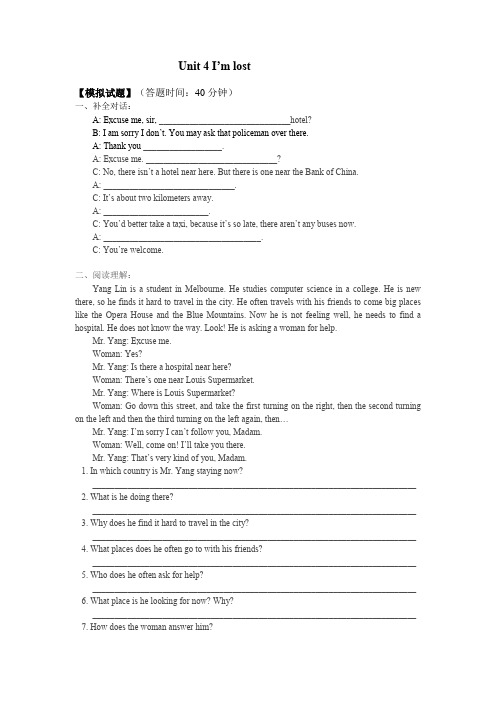
Unit 4 I’m lost【模拟试题】(答题时间:40分钟)一、补全对话:A: Excuse me, sir, ______________________________hotel?B: I am sorry I don’t. You may ask that policeman over there.A: Thank you __________________.A: Excuse me. ______________________________?C: No, there is n’t a hotel near here. But there is one near the Bank of China.A: ______________________________.C: It’s about two kilometers away.A: ________________________.C: You’d better take a taxi, because it’s so late, there aren’t any buses now.A: ____________________________________.C: You’re welcome.二、阅读理解:Yang Lin is a student in Melbourne. He studies computer science in a college. He is new there, so he finds it hard to travel in the city. He often travels with his friends to come big places like the Opera House and the Blue Mountains. Now he is not feeling well, he needs to find a hospital. He does not know the way. Look! He is asking a woman for help.Mr. Yang: Excuse me.Woman: Yes?Mr. Yang: Is there a hospital near here?Woman: There’s one near L ouis Supermarket.Mr. Yang: Where is Louis Supermarket?Woman: Go down this street, and take the first turning on the right, then the second turning on the left and then the third turning on the left again, then…Mr. Yang: I’m sorry I can’t follow you, Mad am.Woman: Well, come on! I’ll take you there.Mr. Yang: That’s very kind of you, Madam.1. In which country is Mr. Yang staying now?__________________________________________________________________________ 2. What is he doing there?__________________________________________________________________________ 3. Why does he find it hard to travel in the city?__________________________________________________________________________ 4. What places does he often go to with his friends?__________________________________________________________________________ 5. Who does he often ask for help?__________________________________________________________________________ 6. What place is he looking for now? Why?__________________________________________________________________________ 7. How does the woman answer him?__________________________________________________________________________ 8. How does Mr. Yang find the hospital?________________________________________________________________________三、单项选择:1. Go on _________you reach the traffic lights.A. untilB. whenC. afterD. while2. He bought a nice birthday present _______me.A. toB. forC. withD. on3. Can you _________ the hospital in the map?A. findB. find outC. look atD. look for4. You had better _________ your homework first.A. finishesB. not to finishC. finishD. not finishes5. Walk _________ the road, turn left at the third turning.A. toB. withC. inD. along6. The supermarket is about two kilometers ____________.A. awayB. farC. fromD. along7. Which is the way ________hotel?A. ofB. atC. toD. for8. —How can I get to the cinema?—It’s ________ the clothes shop _____the hotel.A. both, andB. between, andC. between, orD. among, and9. The police station is ________ the bookshop.A. inB. in the front ofC. behindD. next10. —Sorry, I’m new here. I don’t know where the park is.—___________.A. It’s too badB. I’m sorry to hear thatC. Thank you all the sameD. Really? I don’t believe you.四、完成下列各句:1. 我该如何去首都博物馆?_________________the Capital Museum?2. 我不知道该如何去101中学。
I‘m Lost! 我迷路了 小学英语教学设计课件
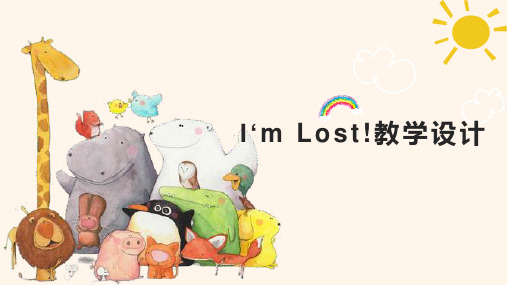
Part 5 Teaching methods
3p teaching method:
Make students receive knowledge more easily and effectively under the guidance of teacher
2 Task-based teaching method:
Help students
acquire knowledge
through practice and
Communicative teaching method:
arouse students' interest in learning;
Improve English communication skills
Part 4 Key points and difficult points
Key points:
Students can learn some new words and expressions;
Read the text very well
difficult points:
cooperation with the classmates to ask and give directions correctly
Most of them have the basic ability of reading and speaking. But have some problems with spelling.
Part 3 Teaching objectives
• Knowledge objectives: Learn new words and expressions :traffic lights, red,
北京市延庆县靳家堡中学八年级英语上册《Unit 4 Lesso

初二学案 Unit 4 Lesson15 He was driving along whensuddenly ….. (新授课)学习目标:1、通过学习,同学们知道while 引导的时间状语从句的结构2、同学们通过学习和练习,能够区分when 和while 引导的时间状语从句之间的区别3、同学们能够根据故事情节的发展,完成指定的相关题目一、复习导入将下列句子译成英文1、当我离开家的时候,我的妈妈在看电视。
_____________________________________________2、当我进班的时候,同学们在读书。
(get into the classroom )___________________________________________________3、当我六岁的时候,我能骑自行车。
___________________________________________________________4、昨天的这个时候,你在做什么?(at that time , yesterday )________________________________________________________5、你在踢足球吗?(用过去进行时)___________________________________________给出下列单词及短语的中文意思1、strange _________2、appear __________3、arr ive at ___________4、through _________5、look for ________6、rain _________7、think about _______ 8、carry _______ 9、say a word ________二、New lesson (新授课)1、Learn exe.1 Suddenly a strange woman appeared . _______________________ 1) Read the text and number them in correct order (正确的顺序)2)Listen to the tape and check your answer3) Read the text and try to find the important phrases (重点短语)(1)看____________ (2)到达____________ (3)寻找_____________(4)在大街上_________(5)考虑___________ (6)回家____________(7)上车____________ (8)下车___________(9)在。
北师大版八年级英语上册全册教案

Unit 1 TelevisionLesson 1 Last week on TVBy listening to the TV programs discussed by the four reviewers and their emotional attitude and other details, education students like to watch different personalities of different TV programs. Introduce the topic of this unit to stimulate students’interest in the topic. Activate students’existing TV program vocabulary, solve students’existing knowledge, and prepare for the final output of the class. Students imitate the example sentences given by teachers, use key words to describe their favorite TV programs, and make a preliminary warm-up for the listening topic.【知识目标】Learn about the use of participle adjectives (-ed and -ing forms).Learn about simple past tense.Talk about a TV program.【能力目标】To train students’ listening and reading skill.Verbally describe why the four reviewers liked the TV shows and discussed their favorite TV shows and reasons with their peers.【情感目标】They should read more news, learn about national events, and become a person with broad vision, love life, and love nature.【教学重点】Focus on the positive and negative sentences in the past tense.【教学难点】Guide students to use the sentence patterns flexibly in activities and life, and cultivate students’ability to read English.MultimediaStep 1. Warm upIs learning a language difficult?Look at the key words. Listen and read.Key words: Language learningcharacter, conversation, grammar, listening, passage, pronunciation, reading, speaking, vocabulary, writingChoose the correct words to complete the sentences on the right.1. She speaks English very well. Her __________________ is quite good.2. He is learning to write Chinese _________.3. Sometimes ____________________ rules are hard to remember.4. I just read an interesting _________ in an old book.5. We had a long ____________ about the interview on the Internet.Step 2.Discussion1. What do you think is difficult about learning a language?2. Have a discussion with your partner, using the key words.Step 3.Listening1. When did Tina come to Beijing?2. Did Tina like her teacher?What did Tina do in her Chinese class?Listen to the first part of the interview and answer the questions.1. When did Tina come to Beijing?2. Did Tina like her teacher?3. What did Tina do in her Chinese class?Think about the information in the chart.Listen to the second part of the interview and complete the notes about James. James—learning ChineseListen to the whole interview and write Tina, James or Tina &James in each blank.1. ______learned some Chinese from games and TV.2. ______ began learning Chinese at university.3. _____________ think(s) Chinese writing is difficult.4. ______ didn’t speak any Chinese before 2008.Step 4.Grammar一般过去时态:陈述句变一般疑问句1. 当句中含有系动词was/were或情态动词could/would时,把系动词或情态动词提到句首。
人教新目标英语八年级上册unit1第4课时优秀教学案例

在教学过程中,我将采用任务型教学法、情境教学法和交际法等多种教学方法,创设生动、活泼的课堂氛围,激发学生的学习兴趣,让学生在真实的语言环境中学习英语,提高学生的语言实践能力。同时,注重分层教学,关注每一个学生的个体差异,让每一个学生都能在课堂上得到充分的锻炼和发展。
3.通过谈论过去发生的事情,让学生学会总结经验,从中汲取教训,培养学生的批判性思维能力。
4.教育学生珍惜现在,关注未来,培养学生的责任感和使命感。
5.培养学生具备跨文化交际的意识,提高学生的跨文化交际能力。
三、教学策略
(一)情景创设
1.利用多媒体手段,如图片、视频等,为学生创设生动、直观的课堂情景,激发学生的学习兴趣。
2.问题导向:教师针对本节课的重难点设计了一系列问题,引导学生思考、讨论,激发学生的求知欲。通过问题链的形式,让学生在解决问题的过程中,系统地掌握一般过去时态的构成和用法,培养了学生的批判性思维能力。
3.小组合作:本案例将学生分成若干小组,分配任务,让学生在讨论、交流中共同完成任务。这种合作学习的方式不仅提高了学生的团队协作能力,还培养了学生的沟通能力、合作精神。
3.鼓励学生提出问题,培养学生的批判性思维能力,提高学生的问题解决能力。
(三)小组合作
1.组织学生进行小组讨论、合作学习,让学生在互动交流中,共同完成任务,提高团队协作能力。
2.设计小组活动,让学生通过调查、采访等方式,搜集关于过去发生的事情的信息,提高学生的实践能力。
八年级英语(人教版)上册:Unit 3-4 学案
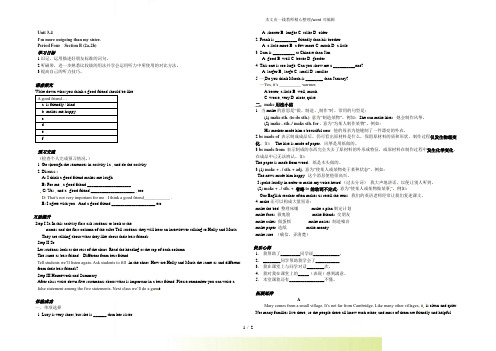
Unit 3-4I’m more outgoing than my sister.Period Four Section B (2a-2b)学习目标1.识记、运用描述好朋友标准的词句。
2.听磁带,进一步熟悉比较级的用法并学会运用听力中所使用的对比方法。
3.提高自己的听力技巧。
课前探究Write down what you think a good friend should be like .A good friend …a. is friendly / kind .b. makes me happy .c.d.e.f.预习交流(检查个人完成预习情况。
)1. Go t hrough the sentences in activity 1a , and do the activity .2. Discuss :A: I think a good friend makes me laugh .B: For me , a good friend ____________________ .C: Yes , and a good friend ____________________ , too .D: That’s not very important for me . I think a good friend____________ .E: I agree with you . And a good friend ____________________ etc .互助提升Step I 2a In this activity first ask students to look at thenames and the first column of the talbe.Tell students they will hear an interviewer talking to Holly and Maria.They are talking about what they like about their best friends.Step II 2bLet students look at the rest of the chart. Read the heading at the top of each column.The same as best friend. Different from best friend.Tell students we’ll listen again. Ask students to fill in the chart. How are Holly and Maria the same as and different from their best friends?Step III Homework and SummaryAfter class write down five statements about what is important in a best friend. Please remember you can write a false statement among the five statements. Next class we’ll do a gam e.体验成功一.单项选择1. Lucy is very short, but she is ______ than her sister.A. shorterB. longerC. tallerD. older2. Frank is __________ friendly than his brother.A. a little moreB. a few moreC. muchD. a little3. Sam is __________ at Chinese than Jim.A. goodB. wellC. betterD. gooder4. This one is too large. Can you show me a __________one?A. largerB. largeC. smallD. smaller5. —Do you think March is ________ than January?—Yes, it’s __________ warmer.A.better, a littleB. well, muchC. worse, veryD. nicer, quite二.make用法小结1. 当make的意思是“做、制造、制作”时,常用的句型是:(1) make sth. (to do sth.)意为“制造某物”。
北京课改版英语 八年级上册 Unit 4 I'm Lost 课后练习题

一、单项选择1. Her voice ____ sweet. It _____ a bird.A.sounds; sounds likeB.sounds like; soundsC.sound; sound likeD.sound like; sound2. _____ she leave home at six? Yes, she does.A.Is B.Can C.Does3. — Why are wetlands so important to wildlife?— Because it can ______ them with food and cover.A.practice B.provide C.prepare D.prevent4. —Do you often go to the gym? —No. ________. I don’t like sports at all. A.always B.usually C.sometimes D.never5. Look! The reporter from CCTV is having an interview ______ Mr Zhou. A.on B.in C.to D.with6. I’m sorry I can’t let you know who_____ me that.A.said B.told C.spoke D.talked7. --What do you do with your homework?--I’m sorry, I _________ it at home.A.forget B.left C.stayed D.Kept8. If you are in trouble, why________ ask the police for help?A.not to B.don’t you C.not you9. If you have headaches often, you need _______ .A.see a doctor B.seeing a doctorC.to see a doctor D.not see a doctor10. Did you see him a toy plane this morning?A.made B.makeC.be making D.to make二、单词拼写11. 缺词填空We have been in Australia for three days. We’re having a w 1 time here. Australia is the sixth largest country in the w 2 . There is so much to see that it is impossible for me to tell you everything. Sydney is a beautiful city. There are many big t 3 and beautiful flowers around the houses and they l 4 really beautiful. There are also some s 5 animals in Australia, such as kangaroos(袋鼠) and koalas(考拉). They are really lovely.During the past three days we’ve visited many p 6 of interest around Sydney. I’d like to spend more time here. But we will f 7 to another city, Cairns, to see coral beds(珊瑚礁)tomorrow. It is said that words cannot describe the beauty(美) of the c 8 corals(珊瑚). Many famous cartoon films were made there. We can enjoy o 9 in Cairns this time tomorrow. I’m looking forward to g 10 there!12. 语法填空Once upon a time, there was a girl named Alice. When she was nine years old, her mother died of 1 (ill). Later, her father Mr. Hand got 2 (marry) again to a pretty woman called Linda. At first, Linda was 3 (friend) to Alice. Twoyears 4 , Linda’s daughter, Alice’s stepsister Helen was born. Alice’slife 5 (change) a lot. Linda didn’t allow Alice 6 ( go ) to school. Alice had to spend the whole day 7 (look) after Helen. From morning to evening, Alice had to stay with Helen. 8 Helen was hungry, she had to get food for her. When Helen was thirsty, she had to get her some water. When Helen felt sleepy , she needed to make the bed for her. But Alice didn’t have enough food to eat, enough water to drink or a good place to live. Six years passed. Helen grew up. Linda thought she didn’t need Alice’s help 9 more. One day Mr. Hand went to work, Linda invited a witch (女巫). She turned Alice 10 a stone. Oh, what a poor girl!13. 根据句意及首字母提示补全单词1. F_____ the doctor’s advice ,and you’ll get well soon.2. We shouldn’t go to school w______ breakfast.3. There is e ____ rain in spring.4. Take care of your t______, or you’ll have a toothache.5. I called Mike , but he wasn`t in. I left a m ______to him.14. 1. The TV programme will not be __________ (结束)until midnight.2. If hunters catch a tiger,they often kill it for its __________ (毛皮)and bones.3. 一What’s your favourite food?一 I like __________ (三明治)best.4. If you leave litter __________ (到处),you will be unweleome.5. Elephants help farmers if people __________ (训练)them.15. 动词填空1. If you work harder, you _______________(get) more points.2. Daniel decided to spend as much time as he could ____________(learn) French.3. It’s so noisy over there. Let’s go and see what ______________(happen).4. Oh, your desk is much tidier than I __________________(think), Timmy.5. ______________(tell) lies isn’t good, my dear. Please never do it again.6. Time seemed _______________(go) faster than usual when I was on holiday.7. You’d better ______________(not leave) your son alone at home. He’s too young.8. _____________(help) yourselves to some cakes, children.三、用所给单词的正确形式填空16. 语法填空。
unit 4《i’m lost》基本句型和词组(北京课改版八年级上)doc
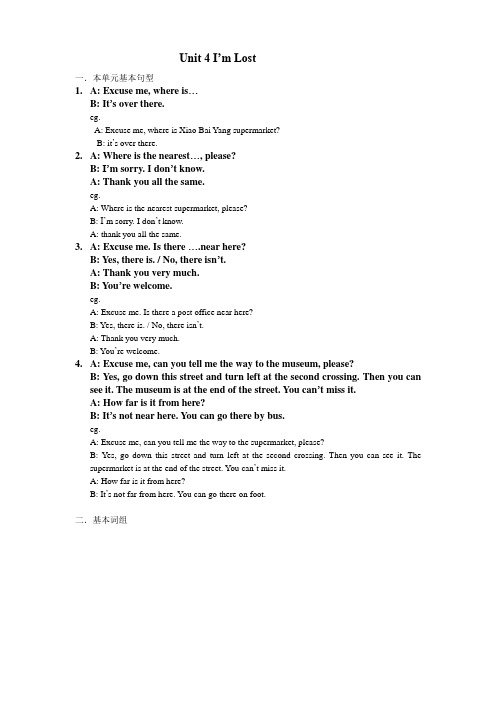
Unit 4 I’m Lost一.本单元基本句型1.A: Excuse me, where is…B: It’s over there.eg.A: Excuse me, where is Xiao Bai Yang supermarket?B: it’s over there.2.A: Where is the nearest…, please?B: I’m sorry. I don’t know.A: Thank you all the same.eg.A: Where is the nearest supermarket, please?B: I’m sorry. I don’t know.A: thank you all the same.3.A: Excuse me. Is there ….near here?B: Yes, there is. / No, there isn’t.A: Thank you very much.B: You’re welcome.eg.A: Excuse me. Is there a post office near here?B: Yes, there is. / No, there isn’t.A: Thank you very much.B: You’re welcome.4.A: Excuse me, can you tell me the way to the museum, please?B: Yes, go down this street and turn left at the second crossing. Then you can see it. The museum is at the end of the street. You can’t miss it.A: How far is it from here?B: It’s not near here. You can go there by bus.eg.A: Excuse me, can you tell me the way to the supermarket, please?B: Yes, go down this street and turn left at the second crossing. Then you can see it. The supermarket is at the end of the street. You can’t miss it.A: How far is it from here?B: It’s not far from here. You can go there on foot.二.基本词组1.between A and B2.next to the post office3.in front of our school4.opposite to the telephone box5.bus stop No. 3456.on Fifth Street7.drug store8.fire station9.gas station10.I am lost.11.turn left12.turn right13.get off at North Station14.take the second turning on the left15.walk along the street16.walk down the street17.at the corner18.follow my directions19.so far20.go straight on this street21.give me a call22.step to the left23.walk forward24.turn around。
八年级英语上Unit 4 I’m lost学案(北京课改版)
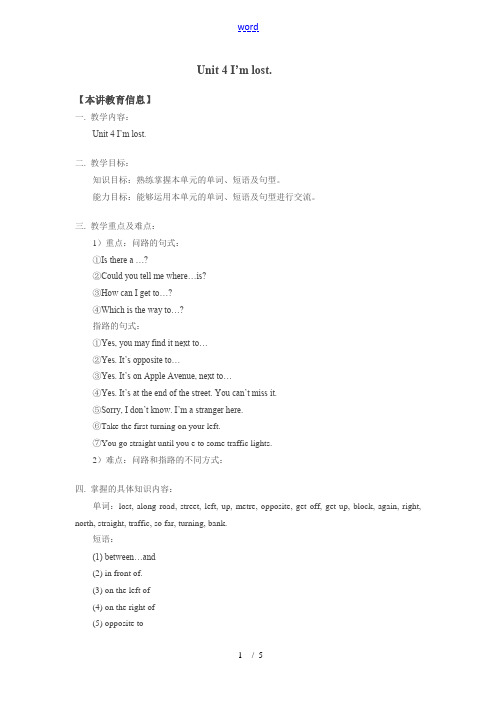
Unit 4 I’m lost.【本讲教育信息】一. 教学内容:Unit 4 I’m lost.二. 教学目标:知识目标:熟练掌握本单元的单词、短语及句型。
能力目标:能够运用本单元的单词、短语及句型进行交流。
三. 教学重点及难点:1)重点:问路的句式:①Is there a …?②Could you tell me where…is?③How can I get to…?④Which is the way to…?指路的句式:①Yes, you may find it next to…②Yes. It’s opposite to…③Yes. It’s on Apple Avenue, next to…④Yes. It’s at the end of the street. You can’t miss it.⑤Sorry, I don’t know. I’m a stranger here.⑥Take the first turning on your left.⑦You go straight until you e to some traffic lights.2)难点:问路和指路的不同方式:四. 掌握的具体知识内容:单词:lost, along road, street, left, up, metre, opposite, get off, get up, block, again, right, north, straight, traffic, so far, turning, bank.短语:(1) between…and(2) in front of.(3) on the left of(4) on the right of(5) opposite to(6) next to(7) drive to the library(8) at the end of the street(9) be lost=get lost(10) follow one’s directions(11) turn left/ right(12) walk along Renmin Road(13) walk up zhangshan street(14) at the corner(15) get off(16) walk 2 blocks(17) be far from…(18) go north(19) go straight(20) so far(21) take the first turning on your left(22) half way down on the left(23) make a mistake(24) be late for句型:Is there a…?Could you tell me where… is?How can I get to…?Which is the way to…You can’t miss it.I’m lostI think so.I took Bus No.4 and got off at Changshu Street.I turned left and walked along the street one block. Where did you get off the bus?Go straight until you e to some traffic lights.Are you with me so far?Take the first turning on your left.My home is half way down on the left, next to a bank. Walk up Zhongshan Street about 500 metres.It’s difficult for Bob to find Linda’s home.He got lost on his way.He was sorry that he made such a mistake.语法:本单元语法主要是介绍问路和指路的句式。
Unit3Lesson17I'mLost(教案)2023-2024学年英语四年级上册-冀教版(三起)
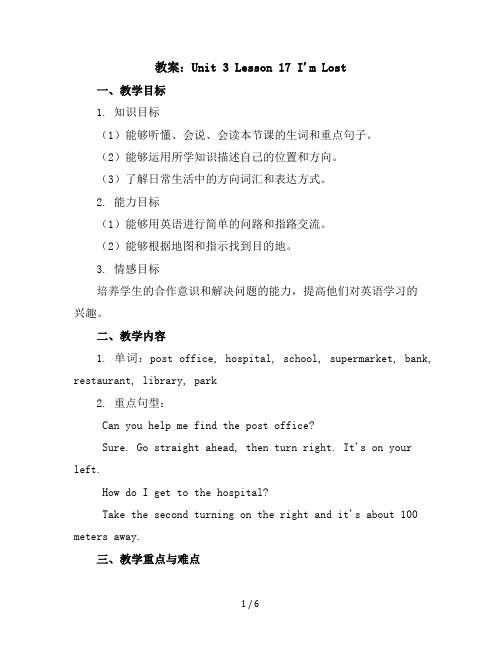
教案:Unit 3 Lesson 17 I'm Lost一、教学目标1. 知识目标(1)能够听懂、会说、会读本节课的生词和重点句子。
(2)能够运用所学知识描述自己的位置和方向。
(3)了解日常生活中的方向词汇和表达方式。
2. 能力目标(1)能够用英语进行简单的问路和指路交流。
(2)能够根据地图和指示找到目的地。
3. 情感目标培养学生的合作意识和解决问题的能力,提高他们对英语学习的兴趣。
二、教学内容1. 单词:post office, hospital, school, supermarket, bank, restaurant, library, park2. 重点句型:Can you help me find the post office?Sure. Go straight ahead, then turn right. It's on your left.How do I get to the hospital?Take the second turning on the right and it's about 100 meters away.三、教学重点与难点1. 重点:单词post office, hospital, school, supermarket, bank, restaurant, library, park;句型Can you help me find the post office? 和 How do I get to the hospital?2. 难点:正确运用地图和指示进行问路和指路。
四、教具与学具准备1. 教具:PPT、地图、指示牌、卡片2. 学具:笔记本、文具盒、地图五、教学过程1. 热身(5分钟)(1)教师与学生进行简单的英语对话,询问学生周末活动。
(2)学生分享自己的周末活动,教师引导学生用英语进行表达。
2. 引入(10分钟)(1)教师展示一张地图,引导学生观察地图上的主要地点。
四年级上册《I’m Lost》教学设计

四年级上册《I’m Lost》教学设计四班级上册《I’m Lost》教学设计教学目标[德育目标]:理解本课的大意能娴熟的运用,娴熟地使用交通用语[智育目标]:1.认读、记忆单词lost map speak sloly2.听懂本课对话:Im lost.Please speak sloly.3.学会问路、指路。
[素养进展目标]:学会问路、指路。
教学重点难点[教学重点]:娴熟地使用Where is ......?来问路[教学难点]:娴熟地使用Where is ......?来问路。
教学预备课件、实物、卡片同学活动设计结组练习,朗读单词情景演示Im lost教学过程一、师生相互问候。
二、复习:复习数词one to one hundred三、学习新课:1.导入新课,板书课题。
2.看卡片,说单词:lost map speak sloly3.结组练习,朗读单词:引导同学看课件,听对话。
重点句子解释:Im lost 我迷路了。
Go don this street and turn left.顺着这条街走,然后左拐。
4.情景演示Im lost5.同学连续看课件,学习其次部分。
对话的大意概括。
重点句子概括:I dont understand. Please speak sloly .6.小组练习指路、问路。
在拓展运用语言的环节上,起初我做得并不够,把小组合作放在了Let's do 上占用了不少时间,然后我又设计了小组合作设计共同的家,并用本节课所学语言进行操练,效果还不错。
四、练习:课堂作业12页。
四班级上册《I’m Lost》教学设计1.排排序,组成句。
2.填一填。
五、练习书写新单词。
六、板书设计:Lesson 7 Im lostlost map speak slolyIm lostGo don this street and turn left.I dont understand. Please speak sloly .七、资料查找:查字典、网上搜寻教学反思《英语课程标准》也指出:学校英语教学的核心是激发同学学习英语的主动性.让他们长久的保持这种兴趣,就需要细心设计组织课堂教学,使同学乐于参预,勇于实践.我把本节课的词汇教学先融入到短语中,就是利用教材本身设计的特点,让同学加入动作的操练。
Lesson17.《I'm Lost!》(教案)-2022-2023学年英语四年级上册-冀教版(三起

Lesson17.《I’m Lost!》(教案)一、教学目标:知识目标:1.学习和掌握用于问路的问句和指示方向的表达方式。
2.学习用简单的句子表达自己的想法和感受。
3.让学生理解和掌握课文中的重点词汇和短语。
能力目标:1.能够听懂、理解和描述生活中常见的场景,如:在路上迷路,问路等。
2.能够有效地表达自己的观点和想法。
3.能够配合老师进行对话练习,并自信地运用所学的语言进行交流。
二、教学重难点:教学重点:1.学习和掌握用于问路的问句和指示方向的表达方式。
2.学习用简单的句子表达自己的想法和感受。
教学难点:1.教学生如何理解和掌握课文中的重点词汇和短语。
2.教学生如何在实际生活中运用所学的语言进行交流。
三、教学过程:A. Warming-up1.Greetings and self-introduction2.Review some common phrases and expressions that they learned in previous lessons related to directions and locations.B. Presentation1.Show a picture of a city street on the board, and elicit from students some possible questions they might ask if they were lost.2.Review the cardinal directions (north, south, east, and west) and basic location words (left, right, straight ahead, etc.).3.Introduce and practice new vocabulary words related to directions and locations, using flashcards and miming.C. Reading and Listening1.Play the audio recording of the dialogue and have the students listen carefully.2.Have the students practice reading the text aloud, either as a class or in small groups.3.Ask comprehension questions to ensure the students have understood the dialogue.D. Practice1.Split students into pairs or groups and have them practice the dialogue with each other, alternating between being the lost person and the passerby.2.Encourage the students to use the new vocabulary words and expressions introduced earlier in the lesson.3.Monitor and provide feedback as the students practice.E. Extension1.Ask students to create their own dialogues in which they areeither lost or helping someone who is lost.2.Encourage them to use the new vocabulary they have learned and to be creative with the situations they imagine.3.Have students present their dialogues to the class, or record them and play them back for the whole class to hear.F. Summary and Homework1.Review the key vocabulary and phrases from the lesson.2.Assign homework, such as writing a short paragraph about a time they got lost or helping someone who was lost and using some of the new vocabulary words and expressions they have learned.四、教学评价:A. Formative Assessment:1.Observe students’ participation during group or pair activities.2.Listen to their speaking during various activities throughout the lesson.3.Provide feedback and make suggestions for improvement.B. Summative Assessment:1.Have the students complete a written quiz or test that assesses their understanding of the new vocabulary words and phrases introduced in the lesson.2.Listen to their oral performances during group or pair activities.3.Give students a grade based on their comprehension, speaking fluency, and accuracy.。
北师大版英语八年级上册全册最新精品教案

北师大版英语八年级上册全册最新精品教
案
该教案分为以下几个模块:
1. Unit 1:Where's your pen pal from?
本模块主要涵盖介绍笔友的国家,研究询问家庭成员和朋友的
情况及回答,并掌握一些关于英语国家文化的知识。
2. Unit 2:Where did you go on vacation?
本模块主要涵盖介绍假期去的地方,研究询问旅行线路、交通
工具、旅行时间、景点介绍和旅行经历,并掌握一些常用的短语和
交际技巧。
3. Unit 3:What were you doing when the rainstorm came?
本模块主要涵盖过去进行时态,研究描述一些过去正在发生的
事情,有关天气和自然灾害的知识,以及应对不同应急情况的表达。
4. Unit 4:Were there any animals in the park?
本模块主要涵盖there be句型,研究描述某个场所的存在事物,并掌握一些描述自然界和动物的单词和短语。
5. Unit 5:Why do you like pandas?
本模块主要涵盖动物及其性的知识,研究掌握一些描述动物的
形容词和描绘性语言。
同时,还要深入了解中国的国宝——大熊猫,并掌握一些与动物保护相关的词汇和短语。
6. Unit 6:When was it invented?
本模块主要涵盖发明和发现的知识,研究询问或描述某个发明
或发现的历史背景、过程和影响,并掌握一些与科技和发明相关的
词汇和短语。
该教案贯穿了听、说、读、写等多个方面,内容丰富、实用性强,符合八年级学生的学科特点,是一份优秀的教学参考。
北师大版八年级英语上册全册教案
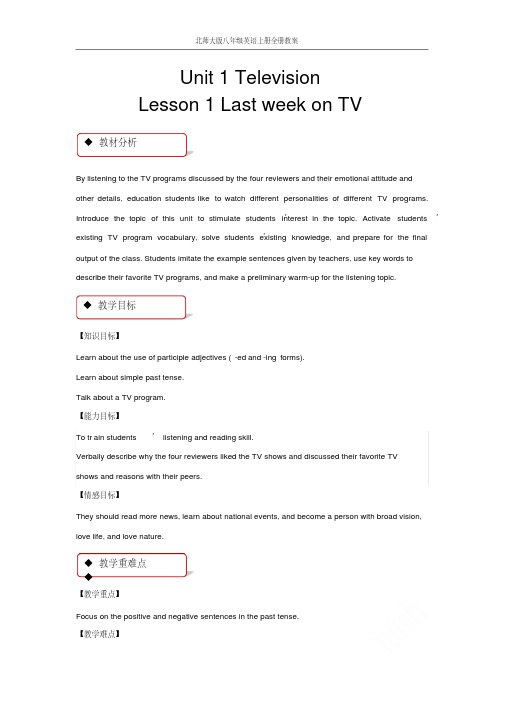
Unit 1 TelevisionLesson 1 Last week on TVBy listening to the TV programs discussed by the four reviewers and their emotional attitude and other details, education students like to watch different personalities of different TV programs. Introduce the topic of this unit to stimulate students ’ interest in the topic. Activate students ’ existing TV program vocabulary, solve students ’ existing knowledge, and prepare for the final output of the class. Students imitate the example sentences given by teachers, use key words to describe their favorite TV programs, and make a preliminary warm-up for the listening topic. 【知识目标】Learn about the use of participle adjectives (-ed and -ing forms).Learn about simple past tense.Talk about a TV program.【能力目标】To tr ain students ’ listening and reading skill.Verbally describe why the four reviewers liked the TV shows and discussed their favorite TV shows and reasons with their peers.【情感目标】They should read more news, learn about national events, and become a person with broad vision, love life, and love nature.【教学重点】Focus on the positive and negative sentences in the past tense.【教学难点】◆教学目标◆教学重难点◆◆教材分析Guide students to use the sentence patterns flexibly in activities and life, and cultivate students ability to read English.◆课前准备◆Multimedia◆教学过程Step 1. Warm upIs learning a language difficult?Look at the key words. Listen and read.Key words: Language learningcharacter, conversation, grammar, listening, passage, pronunciation, reading, speaking, vocabulary, writingChoose the correct words to complete the sentences on the right.1. She speaks English very well. Her __________________ is quite good.2. He is learning to write Chinese _________.3. Sometimes ____________________ rules are hard to remember.4. I just read an interesting _________ in an old book.5. We had a long ____________ about the interview on the Internet.Step 2.Discussion1. What do you think is difficult about learning a language?2. Have a discussion with your partner, using the key words.Step 3.Listening1. When did Tina come to Beijing?2. Did Tina like her teacher?What did Tina do in her Chinese class?Listen to the first part of the interview and answer the questions.1. When did Tina come to Beijing?2. Did Tina like her teacher?3. What did Tina do in her Chinese class?Think about the information in the chart.ReasonLearning experience In the US:In China:Listen to the second part of the interview and complete the notes about James. James—learning ChineseListen to the whole interview and write Tina, James or Tina &James in each blank.1. ______learned some Chinese from games and TV.2. ______ began learning Chinese at university.3. _____________ think(s) Chinese writing is difficult.any Chinese before 2008.4. ______ didn’t speakStep 4.Grammar一般过去时态:陈述句变一般疑问句1. 当句中含有系动词was/were或情态动词could/would时,把系动词或情态动词提到句首。
- 1、下载文档前请自行甄别文档内容的完整性,平台不提供额外的编辑、内容补充、找答案等附加服务。
- 2、"仅部分预览"的文档,不可在线预览部分如存在完整性等问题,可反馈申请退款(可完整预览的文档不适用该条件!)。
- 3、如文档侵犯您的权益,请联系客服反馈,我们会尽快为您处理(人工客服工作时间:9:00-18:30)。
Unit 4 I’m lost.【本讲教育信息】一. 教学内容:Unit 4 I’m lost.二. 教学目标:知识目标:熟练掌握本单元的单词、短语及句型。
能力目标:能够运用本单元的单词、短语及句型进行交流。
三. 教学重点及难点:1)重点:问路的句式:①Is there a …?②Could you tell me where…is?③How can I get to…?④Which is the way to…?指路的句式:①Yes, you may find it next to…②Yes. It’s opposite to…③Yes. It’s on Apple Avenue, next to…④Yes. It’s at the end of the street. You can’t miss it.⑤Sorry, I don’t know. I’m a stranger here.⑥Take the first turning on your left.⑦You go straight until you come to some traffic lights.2)难点:问路和指路的不同方式:四. 掌握的具体知识内容:单词:lost, along road, street, left, up, metre, opposite, get off, get up, block, again, right, north, straight, traffic, so far, turning, bank.短语:(1) between…and(2) in front of.(3) on the left of(4) on the right of(5) opposite to(6) next to(7) drive to the library(8) at the end of the street(9) be lost=get lost(10) follow one’s direction s(11) turn left/ right(12) walk along Renmin Road(13) walk up zhangshan street(14) at the corner(15) get off(16) walk 2 blocks(17) be far from…(18) go north(19) go straight(20) so far(21) take the first turning on your left(22) half way down on the left(23) make a mistake(24) be late for句型:Is there a…?Could you tell me where… is?How can I get to…?Which is the way to…You can’t miss it.I’m lostI think so.I took Bus No.4 and got off at Changshu Street.I turned left and walked along the street one block.Where did you get off the bus?Go straight until you come to some traffic lights.Are you with me so far?Take the first turning on your left.My home is half way down on the left, next to a bank.Walk up Zhongshan Street about 500 metres.It’s difficult for Bob to find Linda’s home.He got lost on his way.He was sorry that he made such a mistake.语法:本单元语法主要是介绍问路和指路的句式。
五. 重点知识讲解:1)问路方式:①Is there a ________? 例如:Is there a hospital near here? Where is the nearest hospital?Is there a post office near here?②Could you tell me where…is? 例如:Could you tell me where the post office is?Could you tell me where the nearest bus stop is?同义句:Can you tell me where…is?③How can I get to…?例如:How can I get to the cinema?How can I get to the bank?注意:How can I get there?④Which is the way to…? 例如:Which is the way to the restaurant?Which is the way to the CapitalMuseum?拓展:问路:Could you tell me the way to…?Could you tell me how I can get to…?Could you tell me how to get to…?答语(指路)You’d better take a bus.It will take you 10 minutes to walk there.2)turn right/ left 右拐/左拐同义词:turn to the right/ leftturn right/ left at the first turning. 在第一个拐弯处右/左拐同义词:take the first turning on the right/ left.3)Walk down Renmin Road. 沿着人民路往前走。
同义句:Walk along…Go down…Go along…4)Walk along the street until you see a supermarket. 直走直到你看见一家超市。
Walk along the street until the traffic lights.沿着街道往前走直到红绿灯。
5)It’s difficult for Bob to find Linda’s home.It’s +adj+ for sb. to do sth.It’s very easy for a stranger to get lost in this city.It’s good for you to do more reading.6)He was sorry that he made such a mistake.他犯了这样一个错误,他很难过。
sb. be sorry that…I’m sorry that I couldn’t pass the English exam.We were sorry that too many people lost their lives in the great earthquake.7)be late for 迟到Don’t be late for the meeting.Lucy was late for school this morning.【巩固练习】根据句意和首字母提示补全单词。
1)The b______ of China is over there next to the post office.2)Do you know the way to the b______. I would like to some books on computer.3)There is a garden in f______ of our school. We often play there after school.4)I am bringing a nice p______ with me.5)Walk along this road and take the first t______ on your left.根据中英文提示完成下列各句:1)在第二个十字路向右拐。
______ ______ at the ______ ______.2)你能告诉我去邮局的路吗?______ ______ ______ ______ ______ ______ to the post office?3)你最好在第五个路口下车。
______ ______ ______ ______ ______ the bus at the fifth crossing.4)最近的银行大约有2公里远。
The ______ ______ is about ______ kilometers ______.5)西单图书大厦在那家宾馆的右边。
Xidan Bookstore is ______ ______ ______ ______ the hotel.。
